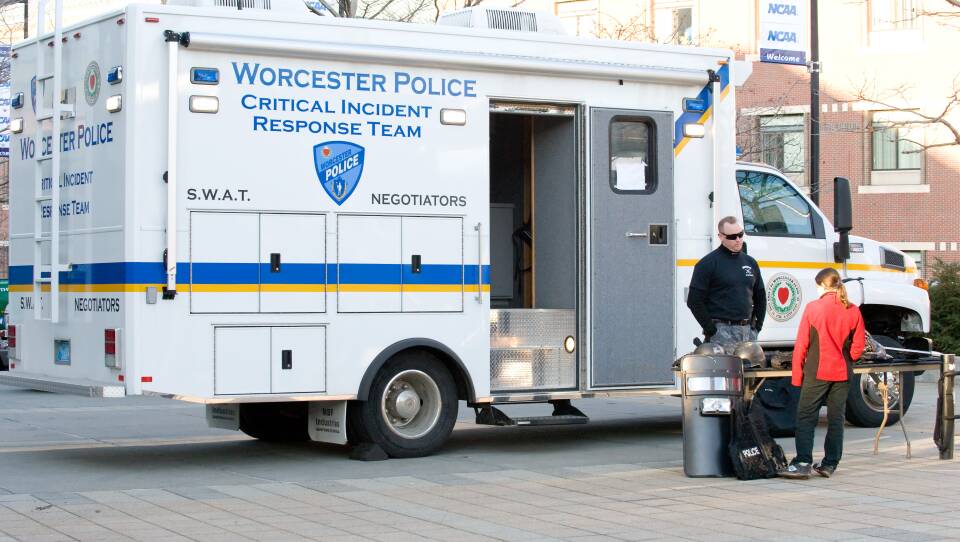Worcester’s interim police chief told city councilors on Tuesday that officers have historically employed tactics that have negatively impacted communities of color, and vowed to ensure the city’s police don’t repeat past mistakes.
“We’re going to do that through several different things,” interim Chief Paul Saucier said during Tuesday’s council meeting. “Looking at how we background officers coming on to the job. Looking at how we supervise our officers. And then the most important component is doing it through the community.”
Saucier’s comments were in response to a recent equity audit that found the Worcester Police Department disproportionately arrests people who are Black or Latino — a disparity that is especially stark among youth under 18. The auditors recommended dozens of policy changes, including establishing a citizen oversight board, improving officer training, diversifying the police force and acknowledging past wrongs committed in communities of color.
The audit, conducted by the Virginia-based Center for Naval Analyses, came as the U.S. Department of Justice continues to investigate Worcester police for excessive use of force and discriminatory tactics based on race and sex. Over the last two decades, the city of Worcester has paid more than $4 million to settle at least three dozen lawsuits against the police department for reasons including false arrests and excessive force .
During the public comment period of the city council meeting Tuesday, Worcester residents of color said their communities continuously experience police discrimination and demanded greater accountability within the department.
“We do not need officers playing basketball with our youth and the next day causing them harm,” Jennifer Gaskin said. “This is ingrained behavior that requires intentional and bold actions to create change.”
Councilor Khrystian King and Mayor Joseph Petty questioned Saucier about the audit’s findings, including that Worcester police collect relatively little information about use-of-force incidents. The auditors also found a “noticeable gap in perspectives between WPD officers and members of the Worcester community.” For example, although residents expressed concerns about misconduct and racial bias among officers, the auditors’ survey of police staff found officers believe they don’t display differential treatment toward people based on race and sex.
When King asked Saucier to respond to those conflicting viewpoints, the interim chief acknowledged wrongdoing in communities of color. His comments were in direct contrast with past statements by Worcester’s former police chief, Steven Sargent, who said in 2020 that institutional racism doesn’t exist within the department.
“I’m glad to see the [interim] chief talking about systematic racism that does exist, how it impacts the community,” Petty said.
Despite Saucier’s acceptance of the audit and commitment to ensuring police operate more equitably, one of Worcester’s police unions has pushed back on the findings of the audit.
In a statement, the New England Police Benevolent Association Local 911 said the report fails to consider underlying factors, such as crime patterns and location, for why police may arrest people who are Black and Latino at higher rates.
The union also noted that there are some offenses for which officers have more discretion under state law to make arrests or issue citations. When officers do indeed have more freedom in their decision making — like in cases of trespassing and disturbing the peace — the audit found they’re less likely to give citations to people of color.
“This finding dispels the notion that our Officers are predisposed to racial bias and, to the contrary, proves that our members do not exercise discretion in a racially motivated manner,” the union wrote.
The auditors’ final report wasn’t entirely critical of Worcester police. Auditors praised the department for its comprehensive range of training courses “that not only build necessary skills for officers, but also aim to promote fairness and impartiality.” The report also commended Worcester police for its dedicated positions aimed at improving diversity, equity and inclusion and its engagement with the community through programming for underserved youth.
Going forward, Worcester City Manager Eric Batista will convene community meetings to gather more feedback regarding residents’ concerns about the police department. He will then hold additional discussions with councilors and police leaders about how the department can operate more equitably.
The city already has made some progress toward fulfilling some of the auditors’ recommendations.
The audit report suggested Worcester drop a requirement that the police chief and deputy chiefs take the state’s civil service exam. Police departments use exam scores to guide decisions on hiring, promotion and discipline. But over the last decade, dozens of departments have left the civil service system, claiming it prevents them from hiring officers they want.
On March 19, Worcester City Council asked Batista to petition the Massachusetts Legislature to exempt police leadership from the civil service requirement.
“The work is ongoing,” King said Tuesday. “There’s a lot of things to work on.”





